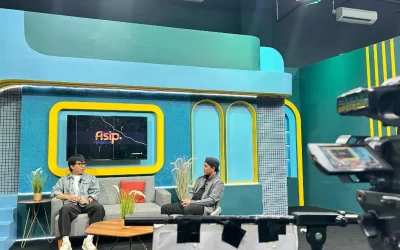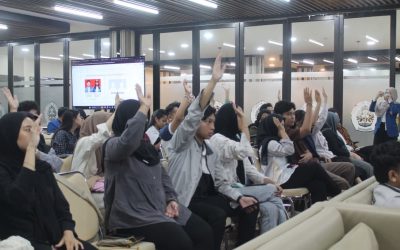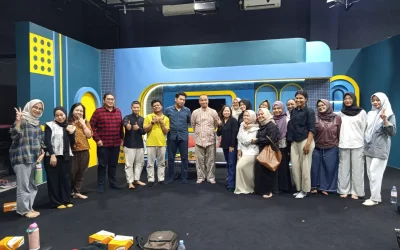Poster Kuliah Dosen Tamu (Source: Salsabila Febryanti)
Semarang – On March 15, 2022, the Department of Communication Studies held a Guest Lecturer with the main theme, namely “Content Regulation in Digital Platform: Regulation by Platforms, by Users, or by State Regulators.” This theme was raised to provide knowledge for Communication Science students so that they are familiar with the system that regulates our lives as internet users, with the internet itself. Communication Studies students who in fact will enter the digital world are expected to be able to understand the basics in this field.
Guest Lecturer Lecture itself is a learning activity carried out by lecturers or teaching staff from outside the university environment and experts in certain fields who are invited to transform knowledge for students. On this occasion, the Department of Communication Sciences invited Sherly Haristya, Ph.D., a researcher at TIFA Foundation Indonesia, guests, namely several lecturers from other universities, and student as participants. The implementation of the Guest Lecturer Lecture utilizes the Zoom virtual meeting platform, considering the current condition of the Covid-19 pandemic is still not over.
The Guest Lecturer Lecture is used by Sherly Haristya to explain the four models that govern our lives and the internet. The four rules include laws that govern through government policies, social norms that apply in society, market conditions (price and availability), and architecture related to technology that allows or prohibits us from using the internet. The explanation of this topic is then based on the discussion question, namely “Do these four elements have an equal role in regulating the internet and our lives? Can one of them have more power than the other?”
The two guest lecturers who attended this lecture responded to the above question, namely Sam AS and Muhammad Nur Rohman. Both have the same view regarding the strength of the four models of rules of life and the internet that each is not always at the same level of power but differs in terms of which rule is the strongest. Sam mentions that the norms and social laws that apply in society are the strongest models. Meanwhile, Rohman is of the view that the law made by the government is the strongest model and the other three models serve as supporting models.
The discussion continued with a question from one of the guest discussion participants, Permata Pertiwi, which was “Can we trust the digital platform and our data is safe because the digital platform knows us better than the people closest to us?” Responding to Pertiwi’s question, Sherly stated that as users of the digital platform, we are not allowed to give full trust.
“We must not trust digital platforms that hold our data. Because, there was an incident where Facebook sold its users’ data to a company, so since then the state has been trying to create regulations that protect and prevent personal data from being leaked on the internet,” said Sherly.
Sherly appreciated the policies taken by the country in overcoming the problem of data leakage. However, it is very unfortunate that Indonesia has not been ready to respond to cases of data leakage and sales that are rife in recent times. Indonesia itself does not have laws and regulations that become the legal basis for taking strict action against cases of leakage and sale of personal data on digital platforms.
Finally, Sherly said that digital platforms are currently carrying out content moderation, namely actions taken to limit or increase access to content, and usually take the form of content that has been taken down, reduced content ratings, demonetization, and so on. Sherly also discussed the issue of content moderation in Indonesia. The focus is on gray area content, namely content that is not prohibited in freedom of expression by international or community standards but has the potential to cause violence in the real world. Sherly highlighted cases where there were politicians who liked to upload negative content, even threats aimed at women wearing hijab. He discussed the actions of digital platforms in conducting content moderation related to the case of the politician’s upload.
Feeling interested in the topic above, Ezekiel Allen who is a guest lecturer expressed the opinion that not all negative content against women who wear hijab should be immediately removed or taken down because we need to look at the context and the author. However, the opposite response came from Mother Earth.
“Such content must be taken down immediately because it can cause anxiety or division in society and lead to racism, regardless of the context and who made the statement. One comment can have a big impact,” said Pertiwi.
From this, it can be seen that in Indonesia, cases such as the spread of negative content through social media are still underestimated by some elements. Negative content, no matter who the author is and what the context is, if it smells of SARA and tends to corner, without any consideration, it must be taken down. This is the importance of teaching the constellation science that governs our lives and the internet in the digital age. Even though we live according to the times, we still adhere to ethics and rules.
Reporter: Salsabila Febryanti
Author: Hikmatul Mufarichah
Editor: Langgeng Irma Salugiasih





0 Comments